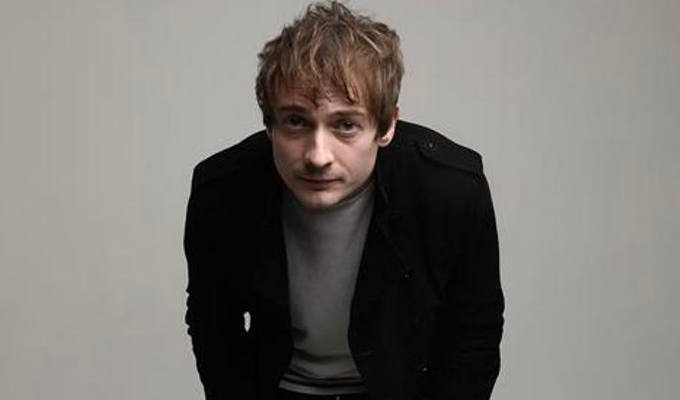
Super November
Note: This review is from 2018
First review of Josie Long's first feature film
■ BY JAY RICHARDSON
At the Glasgow Film Festival
Josie Long's first film contains plenty of the elements familiar from her stand-up: the unabashed hatred of Tories, the full-hearted pursuit of love and a better life, giddy delight in old school socialism and a childlike glee in adopting the drawl of a film noir femme fatale.
Written by and starring the comic as 'Josie', a transplanted Londoner working as a Clydebank librarian, and directed by Douglas King, Super November takes place in the same grimily cool, indie tunes soundtracked, swigging-booze-out-the-bottle-on-the-stoop Glasgow of the pair's previous short films and Long's Radio 4 series, Romance and Adventure. Most obviously with Darren Osborne once again playing Josie's patient flatmate, Darren.
Tonally however, it's like nothing you've ever seen before. Made on a microbudget of less than £4,000 and shot in two distinct periods, spring and winter, the film abruptly switches midway through from a light-hearted rom-com to a grim, police state thriller as the protagonists attempt to flee a world that once contained them so cosily.
There's certainly a dream-like quality to the first half, in Josie's wide-eyed wanders through Glasgow's sun-dappled urban architecture, her loved-up scenes with Mikey (Sean Biggerstaff) and her awakening education in Red Clydeside politics, which she dutifully researches for a library display.
Her incredulity that as Home Secretary, Winston Churchill once sent tanks rumbling into Glasgow's George Square to quell a rioting populace is the most obvious foreshadowing of the restricted freedoms to come.
But with limited opportunities for subtler exposition, the film seeds the creeping fascism of a police state with newspaper headlines, protest posters and snatches of opinion from the television and radio, with Robin Ince recognisable as a blustering DJ and Kiri Pritchard-McLean as a bluff Conservative politician.
The darkest elements of immigrant-monstering from the EU referendum vote are alluded to, and there's a nod to the failed campaign for Scottish independence, with a protest group dubbed 'The 45'. The atmosphere in the second half becomes dystopian, paranoid but unquestionably topical, even prophetic in its anticipation of some of the more troubling rhetoric emanating out of the White House and Brexit debate.
As Josie's love interest, Biggerstaff is perfectly fine, handsome and just a little too square for Darren's tastes. But his role is distinctly secondary to the film exploring her relationship with her flatmate through thick and thin.
Even more affecting though, is Josie's friendship with Roddy (played very much against type by Scot Squad's James Allenby-Kirk). With largely improvised dialogue, Roddy's growth from being a clownish, aggressive wee guy to Josie's rock in her darkest hours is measured, accomplished and a strong marker for Allenby-Kirk's future as a dramatic actor.
The film benefits greatly from its comedian-heavy cast, with Janey Godley hilarious as Josie's foul-mouthed library boss, a dyed-in-the-wool socialist who nevertheless retains a soft spot for Princess Diana. Matt Winning is also amusing as the awkward, would-be-suitor of Josie's friend, too fence-straddling, centre ground politically for the group to embrace. Elsewhere, Chris Forbes reprises the well-meaning innocence of his Scot Squad role as Darren's workmate Big John.
Their reappearance in the bleaker second half ensures a smattering of laughs in what's otherwise a pretty fraught, unrelentingly grim reframing, as well as some much needed continuity and the occasional, jarring shock, as the streetwise survive and the naïve are led away to fates uncertain.
The forces of fascism are never personified, merely heard in the siren for curfew, enforced by warning posters or glimpsed in the blurry, background overcoats of secret police thundering up a corridor. The Revolution Will Be Televised's Heydon Prowse adds some welcome, sinister embodiment as the inscrutable new administrator of the library, keeping tabs on Josie's movements and suggesting she capitalise on her Englishness to escape south.
It is very difficult to shake the feeling that Super November is two films jerry-built and jury-rigged together on abundant goodwill. Several plot turns notwithstanding, not least the inexplicable ending, Long and King have generally made a virtue of their financial restrictions, shooting tightly and focusing hard on the challenged friendships at the heart of the story. Let's hope they get to make more films together.
• Super November is being screened again at 1pm today at the Glasgow Film Festival in GFT1.
Review date: 4 Mar 2018
Reviewed by: Jay Richardson






